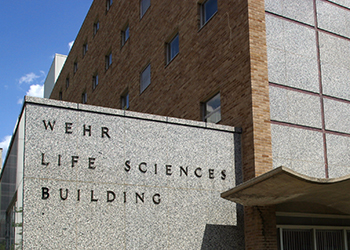Assistant Professor
Global Change and Ecosystem Ecology
Adjunct Curator-Milwaukee Public Museum
Education
B.S., 2006, University of Richmond, Richmond, VA
Ph.D., 2015, Florida International University, Miami, FL
Post-doctoral Fellow, 2015-2019, Colorado State University, Fort Collins, CO
Courses Taught
BIOL3400 Ecology
Research Interests
Climate Warming and Plant-Herbivore Interactions
 I use a combination of laboratory experiments, field experiments, and theoretical modeling to understand the ecological and evolutionary ramifications of climate warming on plant and insect communities.
I use a combination of laboratory experiments, field experiments, and theoretical modeling to understand the ecological and evolutionary ramifications of climate warming on plant and insect communities.
My work to date has demonstrated that warming increases insect metabolic rates, stimulating herbivory. However, herbivore nitrogen limitation also strengthens with temperature. As a result, warming can sometimes be beneficial for insects on high nitrogen plants or deleterious for insects on low nitrogen plants. There is therefore substantial variability in whether warming will increase or decrease insect herbivory and population growth rates.
These patterns are complicated by two factors. First, warming can also reduce plant nutrient concentrations on their own, further strengthening herbivore nutrient limitation. The increase in nutrient limitation can actually stabilize herbivore population dynamics at high temperatures by eliminating ‘boom and bust’ population cycles. However, including predation risk completely reverses these patterns. Herbivores are forced to forage more widely to meet their nutritional requirements and experience higher mortality rates due to increased exposure to predators.
Thus, the impacts of warming on plant-herbivore interactions are highly idiosyncratic and require considering the entire community of plants, herbivores, and predators.
Drought, Herbivory, and Ecosystem Function
 I recently received an NSF award to study the role of insect herbivores in North American grasslands, and how extreme drought strengthens or weaken insect contributions to biogeochemical cycling.
I recently received an NSF award to study the role of insect herbivores in North American grasslands, and how extreme drought strengthens or weaken insect contributions to biogeochemical cycling.
Surprisingly, we don’t have a firm grasp on whether insects appreciably affect primary production in grasslands. Even more surprisingly, it appears that insects can either decrease grassland production via consumption or increase grassland production by stimulating nutrient cycling. No study has yet conducted a long-term, cross-site examination of the effects of insects on grasslands. The first part of this project is to measure grassland primary production and nutrient cycling in the absence and presence of grasshoppers across multiple grassland sites that vary in community composition and climate. This study will be replicated for 3 -5 years to understand the temporal variability in insect herbivory.
Drought can alter insect herbivory by decreasing grasshopper abundances, decreasing plant water content, or increasing plant nutritional content. The second part of this study will use rainout shelters to assess how extreme drought affects insect control of grassland primary production and nutrient cycling.
Ecophysiology, Global Change, and Ecosystem Function
 I combine plant ecophysiological experiments with satellite data to understand the constraints of climate on plant functional types (C3 or C4 grasses) and how climate dictates the sensitivity of grasslands to drought.
I combine plant ecophysiological experiments with satellite data to understand the constraints of climate on plant functional types (C3 or C4 grasses) and how climate dictates the sensitivity of grasslands to drought.
C4 grasses typically exist in hotter, more arid ecosystems than C3 grasses. Furthermore, C3 grass physiology is extremely drought sensitive due to their photosynthetic pathway. However, the paradox is that C4 grasslands, especially arid grasslands, are extremely drought sensitive compared to C3 grasslands. Physiology experiments have demonstrated that C4 grasses do tolerate drought better. However, placing C4 grass physiology into environmental context using satellite estimates of soil moisture demonstrate that C4 grasses often exist closer to their physiological threshold than C3 grasses. As a result, C4 grasslands typically experience more severe declines in production due to drought than do C3 grasslands.
Selected Publications
Lemoine NP, ML Budny (2022) Seasonal soil moisture variability, not drought, drives differences in photosynthetic physiology of two C4 grass species. Plant Ecology 223:627-642
Lemoine NP, ML Budny (2022) Impacts of herbivory on photosynthesis of four common Wisconsin plant species. The American Midland Naturalist 187:14-28
Dorweiler JE, DR Lyke, NP Lemoine, S Guereca, HE Buchholz, ER Legan, CM Radtke, AL Manogaran (2022) Implications of the actin cytoskeleton on the multi-step process of [PSI+] prion formation. Viruses14:1581
Franco ALC, BJ Adams, M Diaz, NP Lemoine, N Dragone, N Fierer, WB Lyons, ID Hogg, DH Wall (2022) Responses of Antarctic soil fauna to climate-driven changes since the Last Glacial Maximum. Global Change Biology 28:644-653
Grupstra CGB, NP Lemoine, C Cook, AMS Correa. Thank you for biting: dispersal of beneficial microbiota through ‘antagonistic’ interactions (2022) Invited Review: Trends in Microbiology 30:10
Lemoine NP. Unifying ecosystem resistance, resilience, recovery, and lag effects from extreme stress into a single statistical framework (2021) Oikos 130:408-421
Lemoine NP (2021) Phenology dictates the importance of climate change on geographic distributions of six co-occurring North American grasshoppers. Ecology and Evolution 11:18575-18590
Grants
Predicting the effects of extreme drought on insect herbivore control of grassland ecosystem function – National Science Foundation
Students
Dr. Lemoine is currently accepting new Ph.D. students into his lab








